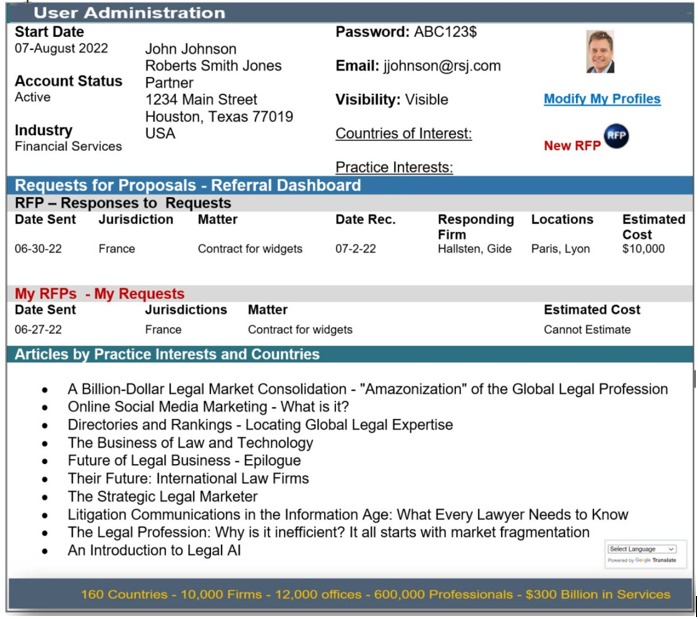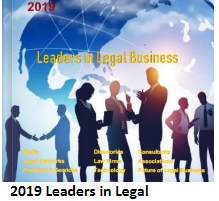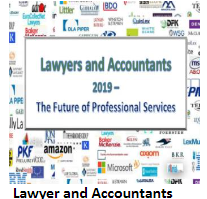Jill Weber Past President, Legal
Marketing Association
Today, legal marketing professionals are
playing an increasingly strategic role for law firms. These professionals bring
to the table both the business acumen and skillset necessary to add unique
substantive value in helping to drive the business of the firm. This
underscores a very important value-add to the firm: providing support to
attorneys in the critical area of business growth at a time when budget and
resources are stretched thin.
According to a 2016 joint survey[1] from the Legal Marketing Association
(LMA) and Bloomberg Law®, more than 80 percent of law firm attorneys cite a
lack of time as their primary challenge in developing new business for their
firms. An additional 30 percent cite lack of staff as a factor, while another
21 percent point to budget constraints. This comes at a time when law firm
focus and emphasis on business development and marketing continues to increase
because of internal and competitive pressures. The survey states that 67
percent of attorneys agree their law firms are increasing their emphasis/focus
on business development and marketing efforts.
For legal marketing, this move into the role
of strategic business partner marks the next evolution of the profession.
For more than four decades, legal marketers have played an important role for
law firms in such areas as communications, market research, ad campaigns, and
event management. Through the years, that role has continually refined with the
emergence of such vital tools as mobile and social technologies, and the
growing role of Big Data, all making information more readily available and
accessible.
As attorneys face the pressure of generating
new business, that role evolves even more, with marketing professionals
undertaking an increasingly diverse set of roles and responsibilities. These
roles touch practice and process improvement, business planning, attorney
coaching, and client service and relationship management.
A 2017 joint study[2] by LMA and Bloomberg Law furthers
this point, demonstrating a mindset shift from the practice of law to the
business of law, with marketing and business development activities being
largely aligned with driving revenue for the firm. In fact, the data shows more
than 82 percent of leading marketing/business development professionals direct
initiatives related to revenue growth.
Today, the strategic legal marketer is one
that is considered to be an advocate for the voice of the client, a
collaborative partner with all law firm business functions to deliver client
value, and extremely engaged with business planning and client
service/relationship management initiatives in these fundamental ways.
Invested in the Client
Law firms increasingly place primary emphasis
on developing broader and deeper relationships with current clients and growing
organically in the practice areas and geographies where they are already
strong. Legal marketers are committed to influencing and leading change to
better serve clients.
When it comes to differentiation, professionals surveyed by LMA and
Bloomberg Law[3] point to investment in client
experience and development of greater knowledge of, and expertise in, their
clients’ businesses as the most effective tactics. These two items reflect a
shift to a client-first mindset and mirror the growing customer experience
trend at the forefront of many consumer products and B2B businesses.
Also reflective of a growing client-first
perspective, marketing/business development professionals are clearly focusing
business intelligence activities on better understanding their clients by
tracking news (87 percent), tracking company information (76 percent), and
tracking industry data/trends (71 percent) to prepare for client meetings and
deliver news/current awareness updates to attorneys.
Refining Core Skills
As legal marketing professionals look to
further position themselves at the center of the firm’s evolution, the need to
consistently refine their set of skills is vital. These skills must be founded
in both the business and practice of law.
The Legal Marketing Association (LMA) — the
“authority for legal marketing” with 4,000 members — defined the core set of
skills for legal marketers in a foundational resource called the Body of
Knowledge (BoK). The BoK clearly defines the essential and accepted domains,
competencies, and associated skill sets within the legal marketing profession
at every level.
This resource helps legal marketers hone their
skills, assists legal marketing managers to develop themselves and their teams,
and provides a universal benchmark against which legal marketers can be
assessed. We invited leaders in each of the six BoK core competencies to share
their insights on key trends and developments in each area.
The Business of Law
Those marketing and business development
professionals who are appropriately proficient in the business of law
understand the legal profession and are able to evaluate firm financial and
operational performance, build strategies to leverage market opportunities, and
implement practices that maximize performance.
When you look at the specific competencies
that define these abilities, you start to see important areas of expertise that
should be familiar to anyone who aspires to lead within a law firm.
Many competing opportunities exist, which
means that legal marketers must play a role in being able to choose those with
the highest return and then collaborate to put them into action. The work of
realizing opportunities must integrate the efforts of multiple departments. For
example, a new practice area will require new promotional materials, but it
will also likely involve recruiting new attorneys to fill in missing
capabilities; other functions will also have an important role to play.
The “business of law” is changing rapidly
because of two factors. The first is technology, which requires efforts across
multiple fronts (Technology Management is one of the BoK core competencies);
the second involves the evolving nature of client expectations. Leaders
understand how these two forces will change a firm, and can be prepared to
address and exploit them. Leaders must show the way and not respond after
events have already swept by.
Increasingly, an important feature that will
differentiate successful and unsuccessful firms is the capacity to bring all
talents to bear, irrespective of their position in the firm and legal training.
Firms must draw on the talents, perspectives, and energies of all attorneys and
professional staff; the perspectives of all roles and responsibilities should
inform strategies and tactics.
Client Services
In order to build revenue, firms need to not
only focus on securing new business, but also on retaining current clients.
According to Harvard Business
School and BTI,[4] profits will increase by 25 percent
or more when client retention rates are elevated by 5 percent.
When focusing on client retention, one way for
firms to differentiate is through client service. Legal marketers continue to
play an important role in this function by implementing client service
initiatives using the following techniques:
1. Establish
Client Service Standards Immediately – Instituting a process for
client intake, therefore ensuring a smooth onboarding with the firm, can really
set a positive tone for a client relationship.
2. Understand
the Clients’ Business – In addition to helping attorneys study and
grasp client objectives, industry trends, news, and policies; legal marketers
also recommend attorneys take time to visit the client and really ingrain
themselves in the working of the company.
3. Keep
Clients Informed – Attorneys should be the source of information
pertinent to a client’s business. Rather than relying on general firm emails as
a means of informing clients of legal developments or upcoming events/webinars,
legal marketers counsel attorneys to email content directly and/or pick up the
phone to discuss. They also recommend that attorneys establish benchmarks for
delivering regular status updates on legal work. Feeling uninformed can result
in client frustration. Clients should never have to ask for an update.
4. Request
Feedback – Legal marketers work with attorneys to conduct
post-matter reviews so they can hear directly from the client what the firm did
well and what could be improved upon. Legal marketers make note of the
feedback, develop a tailored action plan for the next matter, and leverage that
information across firm clients. Conducting annual client assessments are
another avenue for securing feedback on the firm’s overall performance,
responsiveness, quality, and consistency. These in-person meetings typically
yield valuable, actionable client intelligence, and are often more open and
productive with legal marketers in attendance to help facilitate the
conversation and provide an objective assessment.
Communications
Effective communication includes knowing the
audience; communicating in a clear, concise, and timely fashion; maintaining a
good demeanor; ensuring accuracy (and moving quickly to correct any
inaccuracies); and maintaining a resourceful mindset.
Consider this: A marketing liaison on a
high-profile project that involves a firm’s IT department and senior partners
is instantly faced with three different audiences, each with its own
communications style. Some issues that need to be considered are how to
effectively communicate the project timelines to these audiences; how often to
provide updates; and how to receive information from one audience and distill
it for another so that all understand the status of the project at any given
time.
The adage is true: Your knowledge is useless
unless you can effectively communicate it to an intended audience. This is why
having a resourceful mindset is so important. In the scenario above, the
strategic legal marketer understands basic IT lingo and then how to translate
that into an update for the senior partners and a relevant selling point to
convert new clients. Looking at the reverse, it’s likely that the marketer will
receive very limited information from the senior partners and have to create a
list of actionable next steps for the IT team and/or marketing team.
Strategic legal marketers are effective
communicators who are able to receive and distribute complex information in a
way that keeps stakeholders satisfied.
Technology Management
Twenty years ago, a marketer’s skills included
good writing and having a mastery of design, PowerPoint, print, direct mail
marketing, public relations, and event marketing. Today, a marketer
additionally must have mastery of the large number of technologies available to
effectively market his or her organization.
Marketing has become so technological that
many organizations now have a “marketing technologist” — who is considered a
bridge between IT and marketing — a technologically savvy professional with a
deep understanding of data, analytics, and legal operations coupled with the
creative mindset to transition raw data into actionable insights to drive
marketing results. But, all marketers must have a mastery of different
technologies in order to apply them appropriately.
Marketers must be good technologists for a few
simple reasons:
1. The
people that we reach are online;
2. The
ability to engage online is so effective; and
3. Technologies
can amplify marketing efforts effectively.
Technologies used to market
The role of marketing departments in law firms
usually spans traditional marketing — the action or business of promoting and
selling products or services, including market research and advertising — and
sales pipeline management — the action of turning qualified prospects into
paying customers.
Consumers can now engage with a company at an
event; online through web pages, videos or mobile app; through printed
materials; or via social media. Marketers understand the strengths and
weaknesses of each of these media and channels — including their costs and
potential returns on investment (ROI) — and understand which ones to use for a
particular marketing goal. Marketers are proficient at providing a seamless
experience, regardless of channel or device.
Business Development
Much like law firms themselves, legal
marketing professionals are challenged constantly to prove their worth by
adding value for their “internal clients.” Marketers today bring to the table
well-honed business development skills and the ability to provide guidance and
support to attorneys as they work to expand their books of business. Marketers
leverage sharp business development skills and enable lawyers to put their best
foot forward in pursuing work.
Many law firm marketers are called upon to
provide “coaching” for the lawyers they support. To adopt a sports analogy in
which lawyers are the players, business development, when well executed, can
and should encompass not just the role of the game-day coach on the sidelines,
but that of the team’s entire coaching and front office staff. In winning legal
work, as in sports, securing a victory takes more than just fielding the most
talented team. Rather, it requires critical behind-the-scenes planning and
preparation that all falls under the rubric of business development. This
includes assessing the landscape and the opponent, selecting the most effective
combination of players, and educating them on the particulars of the challenge
ahead. This helps them to develop a unified approach that utilizes each team
member’s strengths, ensuring that they practice and condition themselves to
identify and seize upon opportunities that may arise, developing contingency
plans for how to respond when things don’t go as planned, and being nimble
enough to react when momentum shifts. Although execution and implementation may
ultimately fall on the shoulders of the players, there is no doubt that the
most respected coaches are those who, time and time again, put their teams in
the best possible position to win.
By taking on an active role in business
development and collaborating with lawyers to map out game plans and training
regimens that ultimately yield success, legal marketers are helping to advance
the goals of the organization.
Marketing Management and Leadership
A highly functioning
marketing organization transforms what would otherwise be random acts of
marketing into systematic efforts that help achieve a firm’s strategic
objectives, thereby amplifying the value of the function.
Understandably, managing and leading a
function is an advanced skillset that requires both “IQ” and “EQ.” Intelligence
Quotient, or IQ, refers to a person’s intellectual abilities. Emotional
Quotient, or EQ, measures a person’s ability to identify and manage emotions,
both their own and those of others, which helps them create the relationships
that enable collaboration and leadership.
The intellectual challenges for a marketing
leader start with creating a vision for the function that articulates the
difference it can make for a specific law firm. Then, the choice of
organizational structure must support the vision, and reflect the culture and
strategy of the firm. The next task is designing the work processes that will
operationalize the structure, including identifying the marketing technologies
and tools that will best support those processes. Finally, a seasoned marketing
leader will be able to develop a resource plan, including a budget, to execute
the vision.
Of course, people are required to bring the
organization to life, making personnel management a central component of
successfully leading a marketing function. Attracting, developing, and
retaining high-quality talent requires emotional intelligence and leadership
ability. These skills can be cultivated and strengthened over time, and the
dividends of doing so are high. Instilling teamwork and building a
collaborative culture within the function leads to higher productivity and
seamless service to the firm. It encourages everyone to contribute and creates
joint accountability for the function’s performance. Investing in training and
coaching programs further elevates skillsets and helps retain valuable talent,
all of which has a positive impact on morale.
An effective marketing leader is also able to
adroitly manage vendors and consultants to maximize the value received. These
external resources bring several key benefits to the table, including: insight
into best practices; the ability to outsource subject matter expertise;
competitive intelligence; pressure release on strained internal resources; and
professional development and skill enhancement opportunities for the internal
staff who work with them. The strategic legal marketer has a keen sense of when
and where to use external vendors and consultants in order to provide much
needed flexibility.
A Role Refined
Today, the role of
marketing and business development professionals within law firms looks much
different than it did just a few years ago. That role will likely evolve even
further in the years ahead.
As new demands continue to place additional
pressures on business development and client service, law firms can
increasingly look to marketing and business development professionals to play a
more strategic role in growing the business. For law firms looking to best position
themselves for future success, marketing and business development professionals
can and should play a valuable role, particularly when firms are mindful of
providing the necessary tools, resources, and support.
[1] Legal Marketing Association &
Bloomberg Law, 2016 Joint LMA-Bloomberg Law Survey Report, https://www.legalmarketing.org/bloomberg-lma-survey.
[2] Legal Marketing Association &
Bloomberg Law, 2016 Joint LMA-Bloomberg Law Survey Report, https://www.legalmarketing.org/p/cm/ld/fid=2674.
[3] Id.
[4] Frederick F. Reichheld & Phil Schefter, E-Loyalty:
Your Secret Weapon on the Web, Harvard Bus. Rev. (July-Aug.
2000), excerpt available at https://hbswk.hbs.edu/archive/the-economics-of-e-loyalty.





 Software
Software Law
Law Legal
Legal






